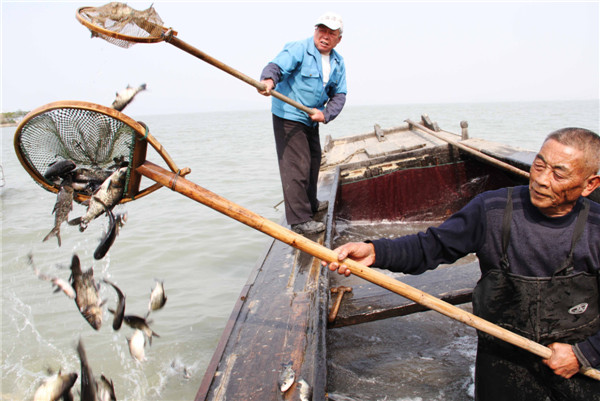Exports start again
 |
|
Fishermen release fish fry into Taihu Lake in Suzhou, Jiangsu province, in 2013. [Photo/Xinhua] |
Sun moved the farm back to Taihu Lake in 2013, and the company started exporting clams again the following year. "In January, we put 1,100 tons of clam larvae into the lake, double the number of last year. We believe the water quality will continue to improve, and that will allow us to put in more clams next year," Sun said.
According to the Jiangsu General Office of Taihu Lake Water Pollution Prevention and Control, the quality of the water in China's third-largest freshwater lake has improved because of the measures imposed by the government and the efforts of local residents and business owners.
"Last year, we investigated nine sources of water and waterworks, which all met or exceeded the national water quality standard," Zhang Limin, deputy director of the general office, said. "The number of blue-green algae blooms and the density of algae in the lake declined in 2014, compared with the previous year, which made it possible to supply 700 million tons of clean water to Jiangsu and neighboring provinces during the year."
According to Mao Ying, director of Aquatic Animal Husbandry in Yixing, a county-level city under the jurisdiction of Wuxi, putting clam larvae into the lake is one of many natural ways of improving the water quality.
"The clams spend a year growing in the lake. They eat algae, which helps to lower the levels of nitrogen and phosphorus in the water," Mao said, adding that cities in the region also provide millions of silver carp, which eat about 42 kilograms of algae for every kilogram of weight they gain.
"Experts are now reviewing the types of plants in the lake in an attempt to lower the pollution level, but although the plants help to purify the water by absorbing some pollutants, their decomposition, especially in summer, lowers the water quality," Mao said.
